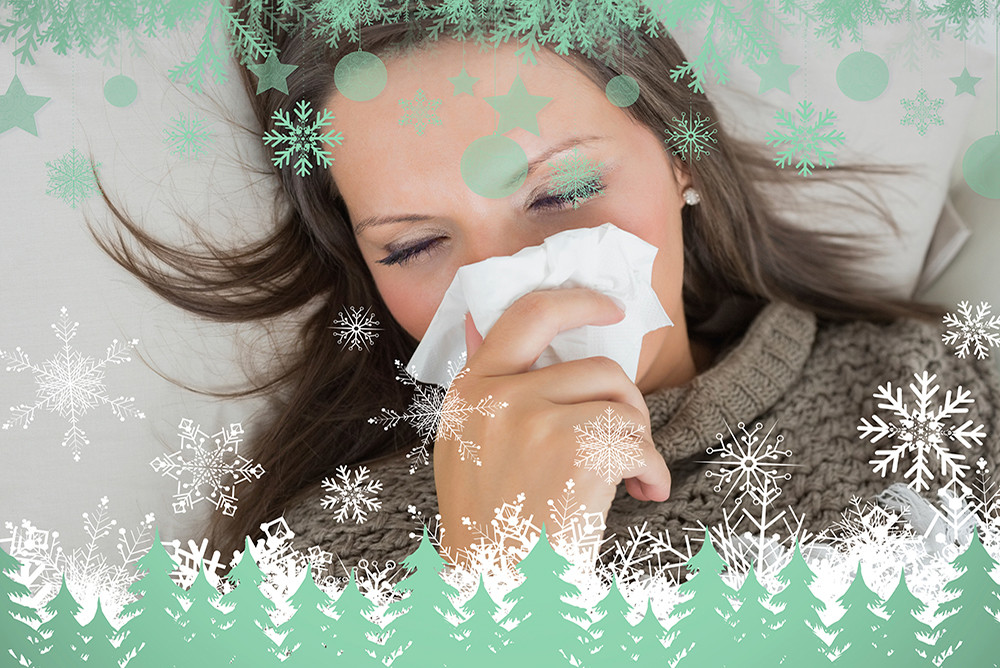
iStock
AS COLD TEMPERATURES turn puddles into treacherous paths of ice, moisture in the nose flows more freely than ever. And just because your nose runs both when you have a cold and when it’s cold outside doesn’t mean cold weather causes colds.
The nose conditions inhaled air to make it warm and moist when it reaches the lungs. When the weather is cold, and usually dry, more mucus is secreted by glands in the membranes lining the respiratory system — nose, throat, lungs — and other body cavities to keep those membranes moist. In one study, almost 100 percent of skiers reported runny noses — also called “skier’s nose,” and officially, rhinorrhea. The colder the weather, the more mucus is produced and the thicker it becomes.
Mucus –- of which a healthy nose secretes about 32 ounces/day — not only moisturizes the membranes, but its sticky consistency is designed to trap outside contaminants and prevent them from entering the body. If the body is fighting a bacterial infection, the immune system will mobilize white blood cells that make the mucus green or yellow; respiratory illnesses like colds and flu provoke less of an immune response, allowing the mucus to remain clear.
In addition to working the mucus glands, cold weather makes tiny capillaries in the nose dilate to bring in more warm blood, which heats incoming cold air almost immediately to body temperature. Although colder air can irritate the lungs and throat, swollen capillaries can also cause nasal congestion.
And finally, because cold air cannot hold as much moisture as warm air, when warm exhaled breath meets cold air at the end of your nose, water is released to run out or remain hanging there in a large droplet. This trifecta of physical reactions to cold weather keeps you healthy but also creates a stuffy, runny nose that resembles that of a cold.
One good solution is to add moisture to the air you’re breathing in. Drench a washcloth in hot water and drape it over your nose and sinuses for several minutes, followed by 30 seconds with a cold cloth. Humidifiers and bowls of water placed around the house can help moisten the air. Also, eat hot bowls of soup and take hot showers. And coping with thickening mucus is one more reason to drink a lot of water.
Outdoors, wrap a wool scarf around your nose and mouth: breathing into the space between your face and the scarf will warm and moisten the air so that your sinuses produce less moisture. Because cold, dry air can cause a sore throat and cough, avoid breathing through your mouth.
When a cold causes swelling in the sinus tissues, gargling with salt water or using a saline nose spray can help, because mucus liquefies better in salty water. The nose can be cleared using a neti pot, but the water should be distilled or boiled to avoid a rare amoeba that lives in warm water.
Try to avoid nasal sprays that narrow the blood vessels, such as Afrin or Neo-Synephrine, because they can have a rebound effect that causes congestion and damage to the nasal membranes. And be careful about blowing your nose too often, which can actually push mucus farther into the sinuses.
Sometimes a runny nose and congestion are a true allergic response to cold temperatures, in which case steroid inhalers like Flonase can help. Other prescription inhalers can help with “vasomotor rhinitis,” triggered by smoke, bright sunlight and strong odors such as perfume.
Finally, “gustatory rhinitis” is a non-allergic reaction to certain foods, such as black pepper, horseradish, chili peppers and onions, which can cause sneezing, sniffling and watery eyes, with no itching — symptoms that usually disappear soon after eating the trigger food.
–Mary Carpenter


Thank you, Mary, for a terrific article. You have addressed all my winter complaints. All I need to do is put your suggestions in practice and I expect be a new person. Winter, here I come!
Wow. What a great treatise on why my nose runs from the moment the heat gets turned on until I start itching from spring allergies. Thanks!